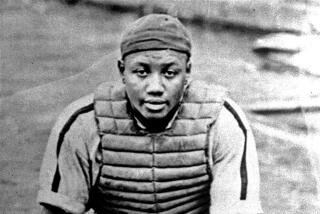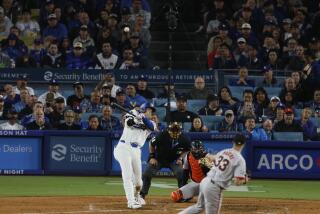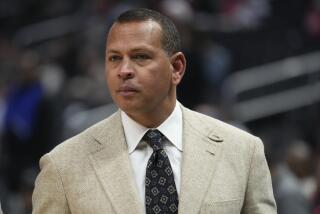Sammy Sosa reportedly had positive drug test in 2003
LOS ANGELES AND CHICAGO — Baseball’s steroid era reared its head again on Tuesday, when a report that Sammy Sosa tested positive for performance-enhancing substances six years ago revived debate on whether owners and players ought to release the names of 102 other players who tested positive at that time.
Although baseball has since adopted a program that publicly identifies players testing positive and suspends them for 50 games, the Sosa report offered a sobering reminder that the sport remains haunted by the steroid era.
The six greatest single-season home-run totals all were produced from 1998 to 2001, by Sosa, Barry Bonds and Mark McGwire. Those three players all have been linked to steroid use. So have all of the All-Star game cleanup batters in that span: Sosa, Bonds and McGwire for the National League; Manny Ramirez, Jason Giambi, Juan Gonzalez and Bret Boone for the American League.
“Most of those guys did some damage off me,” Angels pitcher Darren Oliver said. “Can I take that off my bubble-gum card? That’s what I’d like to know.”
Sosa testified before Congress in 2005 that he never had used performance-enhancing substances. In an interview with ESPN two weeks ago, Sosa said he would formally announce his retirement soon and “calmly wait for my induction to the Baseball Hall of Fame.”
Frank Thomas, the longtime Chicago White Sox slugger and a player who has not been linked to steroids, testified alongside Sosa. Thomas said he was “shocked” that Sosa spoke so forcefully in the ESPN interview and suggested the test result might have been leaked in retaliation.
“I think that fueled the fire,” Thomas said.
In spring training, Alex Rodriguez admitted he had used steroids, after Sports Illustrated reported he was one of 104 players to test positive in 2003, when players were promised anonymity. The New York Times reported Tuesday that Sosa also was one of those players.
The complete list remains sealed under court order, with owners and the players’ union arguing that the confidentiality promised at the time of testing needs to be honored.
“Why don’t we come up with the . . . names, and that’s it?” Chicago White Sox Manager Ozzie Guillen said. “Every time somebody says he’s clean, the next day it’s in the . . . paper. Alex [Rodriguez] says, ‘They can check me.’ He’s gone. Manny [Ramirez] says, ‘They can check me.’ He’s gone.
“A couple of days ago, Sammy says, ‘I’m clean, I should be in the Hall of Fame.’ He’s gone. . . . Open it up, we’re talking about one time, and let’s move on.”
Ramirez was suspended 50 games for violating the drug policy this year. Giambi, who told a federal grand jury six years ago that he had used steroids, said the testing program is working well now and that releasing the names of players that tested positive six years ago would not heal the sport.
“You want to keep going forward,” Giambi said. “You can’t keep going backward.
“Does it really prove anything if you’re on that list or you’re not? All you can do is go forward.”
Oliver, who played with Sosa in the Texas Rangers’ minor league system, offered a blunt reaction to the news of Sosa’s positive test.
“Better him than me,” Oliver said. “He’s the one who has to deal with it. It seems like, if you are caught with this, you can kiss the Hall of Fame goodbye.”
Sosa ranks sixth on the all-time list with 609 home runs, two spots ahead of McGwire. In three years on the Hall of Fame ballot, McGwire has yet to garner even 25% of the votes.
Dodgers Manager Joe Torre said he was not surprised by the Sosa report.
“After Manny, how can you be surprised anymore?” Torre said.
The stench of the steroid era did not disappear upon the adoption of stringent drug testing, Torre said.
“There’s a lot of players today that feel they’ve been lumped in with everybody else just because they hit a ball out of the ballpark,” he said. “That is going to happen. We’re going to have to live through that. The players are going to have to live through that.”
The Sosa report further dampens the joy of the great home-run chase of 1998, when McGwire and Sosa each broke Roger Maris’ single-season record of 61, which had stood since 1961.
McGwire hit 70, Sosa 66. In the following year, McGwire hit 65, Sosa 63.
“Roger Maris held that record for the longest time, and then you had two guys hitting 60-plus, and for a couple years after that,” Torre said. “So it’s a suspicion.”
Giambi said fans who got caught up in the home-run chase should not feel cheated.
“I enjoyed it,” he said. “You guys enjoyed it. You wrote a lot of articles about it. Everybody benefited from it.”
Times staff writers Kevin Baxter in Los Angeles and Mike DiGiovanna in San Francisco and Chicago Tribune staff writer Mark Gonzales in Chicago contributed to this report.
--
--
BEGIN TEXT OF INFOBOX
Implications
Of the top 17 career home run leaders, six have been implicated as steroid users (* -- active player):
*--* Player No. 1. BARRY BONDS 762 2. Hank Aaron 755 3. Babe Ruth 714 4. Willie Mays 660 5. Ken Griffey Jr.* 617 6. SAMMY SOSA 609 7. Frank Robinson 586 8. MARK McGWIRE 583 9. Harmon Killebrew 573 10. RAFAEL PALMEIRO 569 11. Reggie Jackson 563 12. ALEX RODRIGUEZ* 561 13. Jim Thome* 553 14. Mike Schmidt 548 15. Mickey Mantle 536 16. Jimmie Foxx 534 17. MANNY RAMIREZ* 533 *--*
-- Associated Press
More to Read
Go beyond the scoreboard
Get the latest on L.A.'s teams in the daily Sports Report newsletter.
You may occasionally receive promotional content from the Los Angeles Times.






